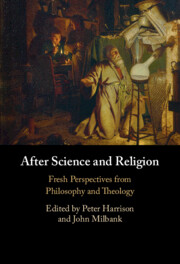Book contents
- After Science and Religion
- Reviews
- After Science and Religion
- Copyright page
- Contents
- Contributors
- Acknowledgements
- Introduction
- Part I Modern Historians on ‘Science’ and ‘Religion’
- Part II Beyond ‘Science and Religion’
- Part III Philosophical Problems with ‘Science’ and ‘Religion’
- Chapter 9 Consciousness, Intention, and Final Causation
- Chapter 10 The Problem of the Problem of Scientism
- Part IV Before Science and Religion
- References
- Index
Chapter 10 - The Problem of the Problem of Scientism
On Expanding the Scope of Scientific Inquiry
from Part III - Philosophical Problems with ‘Science’ and ‘Religion’
Published online by Cambridge University Press: 05 May 2022
- After Science and Religion
- Reviews
- After Science and Religion
- Copyright page
- Contents
- Contributors
- Acknowledgements
- Introduction
- Part I Modern Historians on ‘Science’ and ‘Religion’
- Part II Beyond ‘Science and Religion’
- Part III Philosophical Problems with ‘Science’ and ‘Religion’
- Chapter 9 Consciousness, Intention, and Final Causation
- Chapter 10 The Problem of the Problem of Scientism
- Part IV Before Science and Religion
- References
- Index
Summary
‘Scientism’ is not the artificial dissolution of an otherwise natural and good boundary that divides modern science from other interpretations of the world, such as religion or metaphysics, but constitutes the essence of modern science precisely to the extent that this latter understands itself as making a radical break with the prior study of the world that called itself ‘natural philosophy’. This chapter argues that science becomes ‘scientism’ the moment it denies it is a philosophy of the whole of reality, and pretends instead to limit itself simply to quantitative abstractions and strictly empirical methods. In restricting the scope of its inquiry, and thus claiming a certain ‘epistemic humility’ or ‘modesty’ for itself, science follows a pattern that can be discovered in other instances of the rise of modernity, such as that in politics or economics, and presents analogous problems. The only way to avoid scientism, that is, the totalitarian domination of an abstract conception of nature, is to recover the original aspiration of science as an inquiry into being qua mobile: science must recognize itself most basically as an interpretation of nature, understood as the internal principle of motion and rest that sets the defining horizon for things.
- Type
- Chapter
- Information
- After Science and ReligionFresh Perspectives from Philosophy and Theology, pp. 232 - 256Publisher: Cambridge University PressPrint publication year: 2022
- 3
- Cited by



